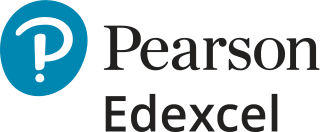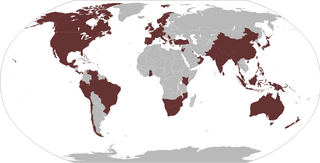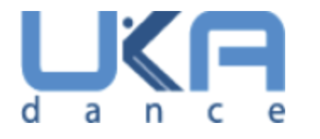
The General Certificate of Secondary Education (GCSE) is an academic qualification in a range of particular subjects, taken in England, Wales, and Northern Ireland. State schools in Scotland use the Scottish Qualifications Certificate instead. Private schools in Scotland may choose to use GCSEs from England.
Structural engineers analyze, design, plan, and research structural components and structural systems to achieve design goals and ensure the safety and comfort of users or occupants. Their work takes account mainly of safety, technical, economic, and environmental concerns, but they may also consider aesthetic and social factors.
The Cecchetti method is variously defined as a style of ballet and as a ballet training method devised by the Italian ballet master Enrico Cecchetti (1850–1928). The training method seeks to develop essential skills in dancers as well as strength and elasticity. Cecchetti-trained dancers are commonly found in ballet and other dance companies throughout the world.

Edexcel is a British multinational education and examination body formed in 1996 and wholly owned by Pearson plc since 2005. It is the only privately owned examination board in the United Kingdom. Its name is a portmanteau term combining the words education and excellence.

The Imperial Society of Teachers of Dancing (ISTD) is an international dance teaching and examination board based in London, England. The registered educational charity, which was established on 25 July 1904 as the Imperial Society of Dance Teachers, provides training and examinations in a range of dance styles and certified dance teacher courses. The ISTD is recognised by the Qualifications and Curriculum Authority and the Council for Dance Education and Training and is also a member of the British Dance Council. It hosts various competitions in many different formats including Modern Ballroom, Latin American, Classical Ballet and Tap Dance as well as contemporary styles like Disco Freestyle.

The Royal Academy of Dance (RAD) is a UK-based examination board specialising in dance education and training, with an emphasis on classical ballet. The RAD was founded in London, England in 1920 as the Association of Teachers of Operatic Dancing, and was granted a Royal Charter in 1935. Queen Elizabeth II was patron of the RAD and Darcey Bussell was elected to serve as president in 2012, succeeding Antoinette Sibley who served for 21 years.

CELTA is an initial teacher training qualification for teaching English as a second or foreign language (ESL and EFL). It is provided by Cambridge Assessment English through authorised Cambridge English Teaching Qualification centres and can be taken either full-time or part-time. CELTA was developed to be suitable both for those interested in Teaching English as a Foreign Language (TEFL) and for Teaching English to the Speakers of Other Languages (TESOL). The full name of the course was originally the Certificate in English Language Teaching to Adults and is still referred to in this way by some course providers. However, in 2011 the qualification title was amended on the Ofqual register to the Cambridge English Level 5 Certificate In Teaching English to Speakers of Other Languages (CELTA) in order to reflect the wider range of students that teachers might have, including younger learners.

The International General Certificate of Secondary Education (IGCSE) is an English language based secondary qualification similar to the GCSE and is recognised in the United Kingdom as being equivalent to the GCSE for the purposes of recognising prior attainment. It was developed by Cambridge Assessment International Education. The examination boards Edexcel, Learning Resource Network (LRN), and Oxford AQA also offer their own versions of International GCSEs. Students normally begin studying the syllabus at the beginning of Year 10 and take the test at the end of Year 11. However, in some international schools, students can begin studying the syllabus at the beginning of Year 9 and take the test at the end of Year 10.

Founded in 1904, the Association of Chartered Certified Accountants(ACCA) is the global professional accounting body offering the Chartered Certified Accountant qualification (ACCA). It has 240,952 members and 541,930 future members worldwide. ACCA's headquarters are in London with principal administrative office in Glasgow. ACCA works through a network of over 110 offices and centres in 51 countries - with 346 Approved Learning Partners (ALP) and more than 7,600 Approved Employers worldwide, who provide employee development.
DELTA is an English language teaching (ELT) qualification for experienced Teachers of English as a Foreign Language (TEFL) and Teachers of English to Speakers of Other Languages (TESOL). It is provided by Cambridge English Language Assessment through authorised Cambridge English Teaching Qualification centres and can be taken either full-time or part-time. The full name of the course was originally the Diploma in English Language Teaching to Adults and is still referred to in this way by some course providers. However, in 2011 the qualification title was amended on the Ofqual register to the Cambridge English Level 7 Diploma In Teaching English to Speakers of Other Languages (DELTA) in order to reflect that the wider range of students that teachers might have, including younger learners.
The Certificate in TESOL (CertTESOL) is an accredited professional qualification awarded in the teaching of "English for speakers of other languages" (ESOL) by Trinity College London. It is a commonly taken teaching qualification in the field of English language learning and teaching (ELT). It is one of various TEFL qualifications available. The Trinity CertTESOL is regulated by the UK's Office of Qualifications and Examinations Regulation (Ofqual) which regulates qualifications, examinations and assessments in England.
The Licentiate Diploma in TESOL, also known as LTCL DipTESOL, is a professional qualification awarded in the teaching of English for Speakers of Other Languages (ESOL) by Trinity College London. It is an advanced teaching qualification, often seen as a follow-up to the CertTESOL, and is accredited in England by the Qualifications and Curriculum Authority at Level 7 on the UK National Qualifications Framework as are master's degrees in related subject areas. Holders of the LTCL DipTESOL are also eligible for credit transfer on some master's degree programs.

The Chartered Quality Institute (CQI), formerly known as The Institute of Quality Assurance (IQA), is the chartered body for quality professionals. It improves the performance of organisations by developing their capability in quality management. As a registered charity, the CQI exists to advance education in, knowledge of and the practice of quality in the industry, the public sector and the voluntary sectors.

The A-level is a subject-based qualification conferred as part of the General Certificate of Education, as well as a school leaving qualification offered by the educational bodies in the United Kingdom and the educational authorities of British Crown dependencies to students completing secondary or pre-university education. They were introduced in England and Wales in 1951 to replace the Higher School Certificate. The A-level permits students to have potential access to university if their grade is of satisfactory quality.

The O-Level is a subject-based qualification conferred as part of the General Certificate of Education. It began in the United Kingdom and has been adopted, often with modifications, in several other countries.

Trinity College London (TCL) is an examination board based in London, United Kingdom which offers graded and diploma qualifications across a range of disciplines in the performing arts and English language learning and teaching. Trinity College London has examined over 850,000 candidates in more than 60 countries worldwide. It is a registered charity in England, Wales and Scotland, and its Patron is HRH The Duke of Kent.

A Yachtmaster qualification is a certificate of competence of the ability to handle either a sailing boat or motor boat in certain prescribed conditions. Three different titles are specified; Yachtmaster Coastal, Yachtmaster Offshore, and Yachtmaster Ocean which specify the level of competence required and the area of operation certified.
The General Certificate of Education (GCE) Advanced Level, or A Level, is a main school leaving qualification in England, Wales, Northern Ireland, the Channel Islands and the Isle of Man. It is available as an alternative qualification in other countries.

UKA Dance, formally known as the United Kingdom Alliance (UKA), is a dance teaching and examination board based in Blackpool, England, and operates internationally. UKA Dance was established in 1902 and provides training in a range of dance styles, with examination syllabi for students, and training courses for people wishing to become certified dance teachers.
Qualitas Career Academy is a private college in South Africa, with campuses in various provinces. The institution delivers attendance/contact-based tuition in two modalities, namely full-time and part-time. Full-time curriculum is aimed at high school graduates/students acquiring their first qualification. The part-time curriculum centres on skills and knowledge required by those already employed. Training and consultation services are presented to the private and government sector.












